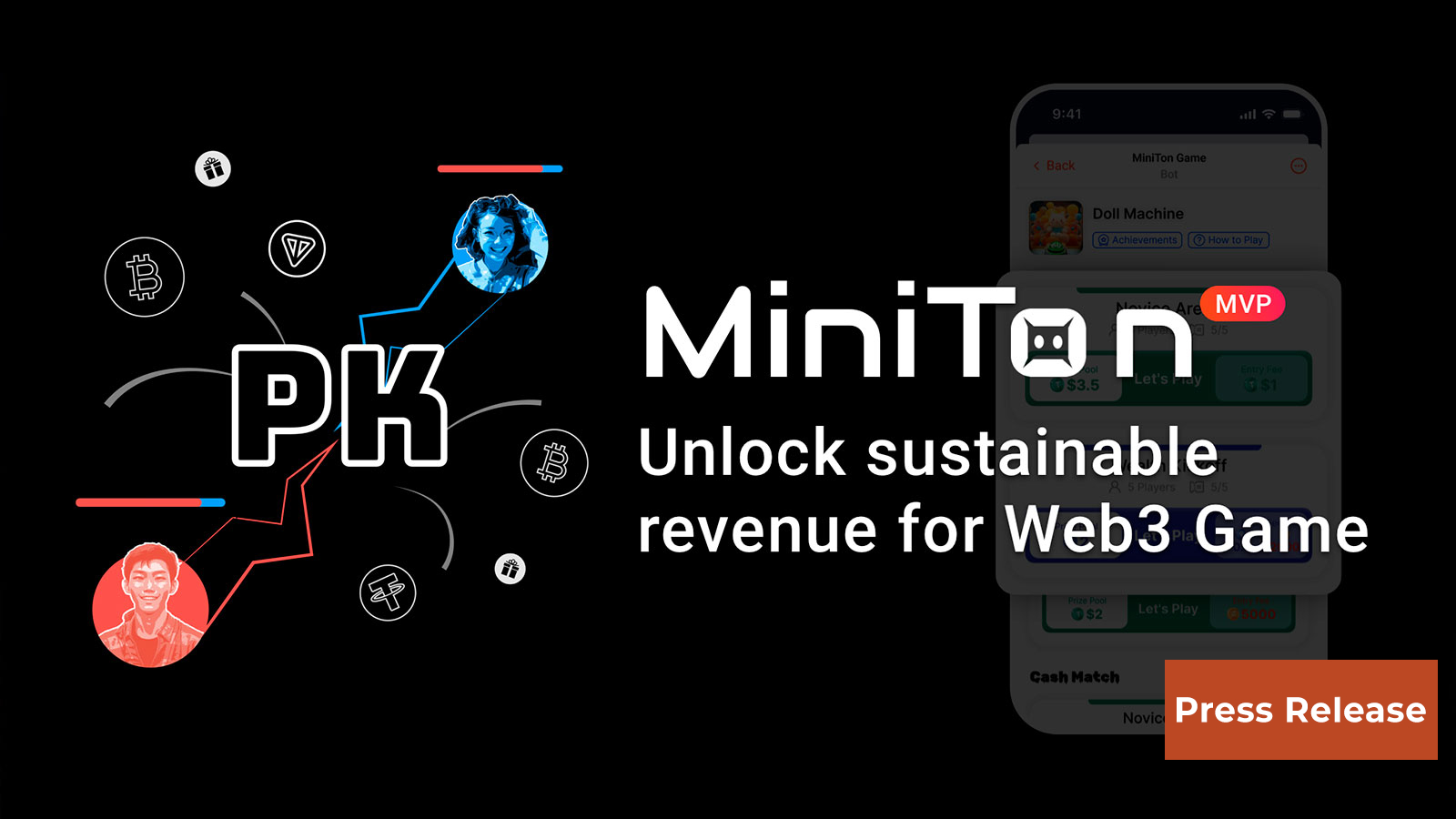MiniTon Announces Seed Funding Round to Pioneer the Future of Mass Adoption in Web3
11/12/2024 16:59
MiniTon Announces Seed Funding Round to Pioneer the Future of Mass Adoption in Web3
November 10, 2024 — Social competitive platform MiniTon has successfully closed its seed funding round, backed by prominent investors including Waterdrip Capital, Alchemy Pay, CGV, Web3Port Foundation, PangDAO Head Ricky, and OGBC Innovation Hub Founder Jayden Wei. Notably, MiniTon's founding team also contributed to this round, underscoring their dedication to the platform's long-term vision and success.
About MiniTon
MiniTon, supported by the TON Foundation, is redefining casual gaming through a blockchain-based "Tournaments as a Service" (TaaS) model, enabling developers to build sustainable revenue streams on Web3. Unlike traditional GameFi projects that rely on token incentives, MiniTon is built to transform the supply of in-game liquidity and offer individual investors a prediction protocol inspired by "FriendTech", allowing them to connect with players by predicting tournament performance. |
The funds will support the development of MiniTon's Alpha version, including core revenue model testing. MiniTon has already facilitated over 360,000 competitive matches, with more than 30,000 on-chain tournaments, demonstrating a profitable Unit Economics model through entry fees.
Addressing Web3’s Core Challenge in Gaming
While casual games like Axie/StepN/Notcoin/Catizen have been instrumental in mainstream crypto adoption, the GameFi sector still lacks sustainable monetization. Developers face pressure to constantly incentivize players with mining rewards, leading to token inflation and diminished interest from both players and developers.
MiniTon tackles this challenge by leveraging the revenue model of Casual Competitive Games. This sector has proven potential, with the casino gaming category on the iOS App Store seeing strong growth. Market research firm-FortuneBusinessInsights projects in this sector to reach $85 billion by 2030, with companies like Skillz (SKLZ · NYSE) achieving valuations up to $15 billion. Unlike gambling, casual competitive games operate within favorable regulatory frameworks globally.
MiniTon’s approach transforms all skill-based casual games into competitive eSports events, shifting rewards from developer-funded incentives to player-to-player earnings. Blockchain technology also allows transparent game records, with tournament funds secured by smart contracts, enhancing player trust and transparency.
Key Milestones and Future Plans
Since launching MiniTon's Alpha on Telegram in August 2024, MiniTon has achieved significant growth:
"We believe profitability is essential. It gives token holders confidence and ensures stability during price fluctuations," a MiniTon developer commented, emphasizing their commitment to sustainable growth. "If a project is profitable, there’s no reason to abandon users(RUG)." |
MiniTon plans to expand its support for additional networks in Q4 2024, aiming to broaden its reach to more developers. This includes integration with chains like Kaia, Solana, Binance Smart Chain (BSC), Ethereum, and Base. Along with this expansion, MiniTon will introduce a range of ecosystem-specific products under the "Mini" series brand: MiniKaia, MiniSol, MiniBSC, MiniEth, and others. These specialized platforms are designed to tailor MiniTon’s competitive gaming model to each network's unique strengths and communities.
Unlocking Unique Value for Web2 Developers and Individual Investors
MiniTon’s solution provides Web2 developers with genuine value in Web3, creating a path to revenue through in-game content rather than relying solely on token value. MiniTon’s service allows developers to integrate blockchain technology seamlessly via SDK, replicating MiniTon's business model and game mechanics with ease.
MiniTon’s Early Access program has tripled ARPU for four Web2 studios, reducing development time by 80%. Initially launched with just one level, the game "Doll Machine" expanded to 100 levels after data validation, setting it up for wider release on iOS and Android.
MiniTon offers unique benefits for individual investors in the crypto space, setting it apart from Web2. In traditional Web2 competitive gaming, investors face high costs and risks to participate in esports tournaments. They primarily bet on outcomes through gambling platforms, often operating outside regulations or being illegal in some areas. MiniTon, however, provides a compliant, blockchain-based solution for safe and transparent engagement in event outcomes and revenue sharing, fundamentally changing their role in competitive gaming.
Revenue Model and Market Potential
MiniTon and its developer partners earn revenue through user entry fees, taking a ~30% commission. If MiniTon captures even 0.1% of the global casual gaming market, revenue could exceed $140 million—surpassing most blockchain networks outside Ethereum, Tron, and Solana.
Beyond creating solutions for GameFi’s revenue sustainability, MiniTon aspires to spark a third wave of Crypto Mass Adoption. By enabling stable revenue generation in Casual Games integrated with blockchain, MiniTon aims to demonstrate the value of blockchain to a wider audience, aligning with a broader vision for a sustainable and accessible Web3 world.
Disclaimer: This is sponsored content. The information on this page is not endorsed or supported by U.Today, and U.Today is not responsible or liable for any inaccuracies, poor quality, advertising, products or other materials found within the publication. Readers should do their own research before taking any actions related to the company. U.Today is not responsible, directly or indirectly, for any damage or loss caused or alleged to be caused by or in connection with the use of or reliance on any content, goods or services mentioned in the article.